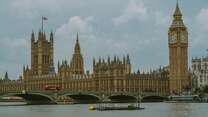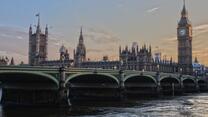With the new Government comes the chance for change: to support refugees, to prioritise women and girls, and to stand with those facing conflict and crisis.
As the new Prime Minister of the UK, Rishi Sunak has a mammoth set of tasks ahead. The UK Government is facing one of the most challenging domestic economic crises seen for decades while humanitarian needs around the world skyrocket. We hope Rishi Sunak will focus on building a fairer, more compassionate world. Here’s how he can do this.
Increase safe and legal routes for refugees, end the Rwanda plan, and invest in integration services
More people than ever - over 100 million - have been forced to flee their homes. Despite this, not enough people are being resettled. Those who are resettled aren’t getting the support they need.
Earlier this year, the Government signed an agreement for the UK Government to deport people seeking asylum in Britain to Rwanda. The new agreement undermines the Universal Declaration on human rights, which states that everyone has the human right to seek asylum. The policy is likely to be ineffective and expensive. People fleeing conflict and crises have already faced enough trauma. The UK Government should be protecting and welcoming refugees, not sending them miles away.
Instead, we are urging Prime Minister Rishi Sunak and the new Government to fundamentally rethink this approach, uphold the right to seek asylum, and expand safe routes for refugees. We are calling on Rishi Sunak and his new Home Secretary to ensure the UK delivers on its resettlement commitments: we would like to see the UK resettle 10,000 refugees each year and expand its commitment to Afghan refugees, delivering 20,000 places under the Afghan Citizens Resettlement scheme in the next 12 months.
We also know how much refugees bring to their communities. That’s why we believe there should also be a focus on supporting refugees as they restart their lives here in the UK. This should include expanded language and job readiness training to ensure refugees can integrate into their new communities as soon as possible.
Return the UK overseas aid budget to 0.7% and lead the way creating a fairer world
In 2021, the UK Government reduced its budget for overseas aid from the target set by the UN of 0.7% to 0.5% of gross national income (GNI). This was the first time that UK Aid has dipped below 0.7% since the commitment was enshrined in law in 2015. It was announced as a “temporary measure”, and the Chancellor who oversaw this reduction, our new Prime Minister, stated that the Government would return to the 0.7% target by 2024. We urge him to keep his promise.
The reduction has equated to a cut of £4.6 billion to some of the world’s most vulnerable people. This not only means that millions will lose out on vital services such as health care and education, but that lives will be at risk too.
The UK is the only G7 country that cut its aid budget during the COVID-19 pandemic, with the US and France committing to increase their aid spending significantly.
The new UK Government should restore the UK Aid budget back to 0.7% GNI by 2024 at the latest and ensure there are no further cuts to this already reduced budget. Lives depend on it.
Prioritise women and girls in crises and conflict
Over one-third of women and girls globally will experience some form of violence in their lifetime. For women and girls caught up in conflict and crisis, the risk is even higher, with 1 in 5 having suffered sexual violence.
Crises by themselves do not cause violence against women and girls, but they accelerate many of the underlying drivers, while public services and protect at a family and community level breaks down.
Historically, the UK Government has been one of the biggest donors to international programmes supporting women and girls. However, reductions to the UK’s aid budget mean there has been a significant reduction in the UK’s support for services for women and girls. As well as a gradual reduction in the proportion of aid funding going to women’s organisations.
What we urgently need now is details of how the UK Government plans to re-establish this budget and programming for women and girls. Specifically, this should include how the Government will prioritise working with local and women-led organisations.
Respond to humanitarian crises in places such as Afghanistan, East Africa and Pakistan
Fragile and conflict-affected countries have been deeply affected by aid cuts, with over £1 billion of the UK’s humanitarian spending reduced (more than any other Government donor). The countries most impacted were fragile and conflict-affected countries such as Syria, Yemen, and Sudan with cuts of 64%, 40%, and 74%, respectively compared to spending in 2020.
It is essential Prime Minister Rishi Sunak and his new Foreign Secretary increase and prioritise funding for these countries. Our analysis shows that they should spend at least 50% of all UK aid in these countries to guarantee we help the most vulnerable people around the world.
Afghanistan
More than half of Afghanistan’s population are in need of humanitarian assistance, nearly four times the number just three years ago. Without substantial international support and efforts to address the collapse of Afghanistan’s economy, triggered by the policies of the new Government, the current crisis could kill more Afghans than the past 20 years of war.
The withdrawal of international support has left public services underfunded and many public servants, such as doctors and nurses,are unpaid. The IRC saw this first hand when we responded to the Afghanistan earthquake in June which killed over 1000 people. Our teams reported that local hospitals struggled to meet the needs of the community.
Furthermore, there has been widespread backsliding on women and girl’s rights in Afghanistan by the country’s new Government.This includes the decision to shut girls’ secondary schools as well as the need for male chaperones when women are outside of the home, curtailing many women’s ability to work and support themselves and their families.
Despite the difficulties posed by the ruling Government in Afghanistan, it is so important the UK Government prioritises finding solutions for Afghanistan.This includes ensuring the humanitarian response is fully funded as well as prioritising funding and working with women and locally-led organisations in Afghanistan. The new Prime Minister and Foreign Secretary should work with international partners to find a path out of the economic crisis.
East Africa
East Africa is currently facing a severe hunger crisis brought on by drought after a record four consecutive failed rainy seasons. In Somalia alone, over half a million people have already fled their homes in search of food and water since the start of 2022.
A famine is expected to be declared imminently, but by then it will be too late to save thousands of lives. We have a narrow opportunity to act.
Famine was averted in 2017, in large part by the UK’s leadership on the issue in funding and encouraging global partners to do the same. However, today the UK has committed less than 1/5 compared to what it did in 2017 The UK Government must increase funding and urge other donors to do the same, as well as drive forward efforts to strengthen global coordination to respond to this urgent crisis.



